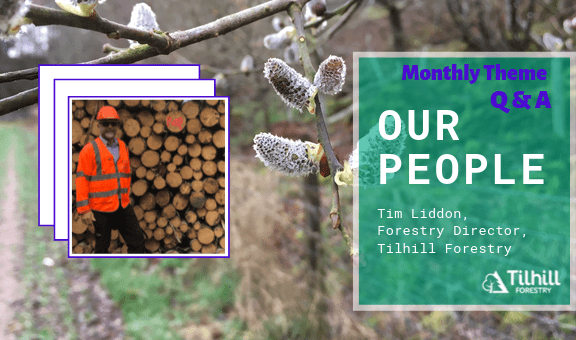This month’s theme is ‘Our People’ celebrating Tilhill Forestry’s staff and their fantastic work.
We asked Tim Liddon, Forestry Director for Tilhill Forestry all about his job role.
Q. What do you do? Tell us about your typical day?
A. My responsibilities as Forestry Director include overseeing our forestry and landscaping activities for the whole of our UK operations as well as the duties that go hand in hand with being a director of a company and the external industry bodies I sit on.
Each day brings its own set of interesting challenges to solve ensuring that no day is the same as the next. If I was to give an overview of my general duties they would include elements of many disciplines including those of strategy, finance, HR, company promotion, client liaison, stakeholder engagement, mediation, negotiation and generally the practise of keeping as many balls up in the air as possible at any given time.
Q. How did you get into forestry?
A. Forestry is in my genes. My Father dedicated his life to forestry and ran his own forestry company. He and I had healthy debates on the relative merits of one rotation of oak and two rotations of spruce. It was natural, given my upbringing in the forestry world, that it would appeal to me as a career.
A. What do you like most about working in the forest industry?
I like being a part of an industry that has a significant positive impact on our environment and therefore the world we all live in. When you consider how planting trees can help mitigate against climate change it is empowering and immensely satisfying to know that the job I do directly contributes towards this extremely important goal.
Q. Why did you decide to work for Tilhill Forestry?
A. In essence, they were the first forestry company to offer me a job right back at the start of my career after I left university with my forestry degree. I even got a pay rise before I started work! However, I have been with Tilhill Forestry ever since so it would be safe to say that they were a good choice for me!
Q. What do you like most about Tilhill Forestry?
A. I like the way the company considers its staff to be its most important asset and takes pride in developing people. I would like to think now that as a director of the company I am contributing to the continuance of this culture.
Q. How do you feel Tilhill Forestry contributes to its employees’ professional development?
A. As a company we actively promote and encourage relevant staff to become members of the Institute of Chartered Foresters (ICF). This membership is a badge of professionalism that we like our staff to aspire to. The Company also runs a Management Development Programme a main element of which is dedicated to nurturing our graduates through the first two years of their employment.
Q. What sorts of changes are occurring in your occupation?
A. One of the most obvious changes I am seeing involves time. On the one hand, we are seeing elements of forestry being sped up by means of trying to grow trees to maturity faster by improving their genetics. The improvement of technology and automation in our harvesting machinery has sped up the process of felling the trees whilst automation in our mills has also sped up processes and efficiencies. Conversely however, it seems to take much longer now to get through the bureaucracy involved in creating and planting the forests of our future. The trees that will supply our future forest industry and provide the next generation of foresters with their livelihoods.
Q. Are you part of any industry organisations? What do they do?
A. I sit on a number of committees, one of the most influential being the Conifer Breeding Co-Operative dedicated to taking forward the breeding programmes of productive conifers (Sitka Spruce, Douglas Fir, Norway Spruce and Western Red Cedar for example) which involves the field of genomics and selective breeding. I was a founding member negotiating the formation of the Co-op together with others who believe in using better genetics than our first rotation crops.
I also work with the Hylobius Industry Research Programme, a group dedicated to researching ways to mitigate against the Pine Weevil that is a major pest of Sitka Spruce.
I am a Fellow of the Institute of Chartered Foresters (ICF) and last year chaired the Woodland Creation Workshops which were born out of the MacKinnon report.
Q. How does a person progress in your field?
A. If you have a passion for forestry and align yourself with a company that has a desire to invest in its staff then you are already in a good position to develop forestry as a solid career.
Q. What is your advice to anyone wishing to pursue forestry as a career?
A. If forestry is what you want to do then just make sure you explore every avenue available to you in order to ensure you succeed in your desires



